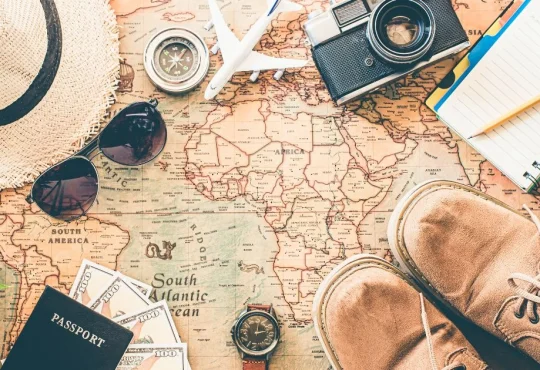Hey there, first-time flyer! Whether you’re excited or nervous about your inaugural flight, this step-by-step guide is here to ease your journey. Flying offers a safe and exhilarating way to explore new destinations worldwide, but navigating the airport and airplane can be a whole new experience. Compared to other modes of transportation, flying involves unique preparations, procedures, and sometimes even language considerations due to regulations and safety protocols. Let us introduce you to essential tips for your first flight, from pre-flight preparations at the airport to soaring high above the clouds!
First-Time Traveler Tips: 5 Best Guides for Your First Flight!
In this guide, we’ll ensure you’re fully prepared for your first flight by covering essential topics: booking a flight, pre-departure preparations such as packing your bags, navigating check-in procedures at the airport, what to expect during your time at the airport, insights into the airplane experience itself, and tips for post-arrival activities. Whether it’s understanding booking options or mastering airport logistics, this comprehensive overview will help you confidently and easily navigate every step of your journey.
What essential information should you know before your first flight?
Gather All Necessary Documentation
Before your flight, gather all necessary documentation, including vaccines and insurance. Having these items in order is crucial for a seamless boarding process. Take the time to verify the specific requirements for each country you intend to visit by consulting the websites of local governments or embassies, ensuring you have the most up-to-date information. Double-checking these details will provide a smooth experience for your first flight and set a reliable foundation for future travels.
- ID and Expiration Date Alignment:
Ensure your passport or ID card aligns with your nationality and destination requirements. Verify that your identification remains valid on your travel day and meets the duration required after your departure. Typically, passports should be valid for at least six months beyond your travel dates to avoid entry issues. Check entry regulations specific to your destination country to avoid surprises upon arrival, and consider renewing your passport if necessary.
- Visa Verification:
Before traveling, check for a visa and determine the correct type (e.g., tourist, work). Government and embassy websites provide the most reliable and up-to-date information on visa requirements based on your nationality and destination. Tools like the Passport Index can also help clarify visa requirements. Relying on official sources ensures accurate information, facilitating a smooth travel experience without visa-related issues.
- Travel Insurance:
Never travel without travel insurance, which covers unforeseen incidents like theft, lost luggage, trip cancellation, medical expenses, and even death. It’s a wise investment that provides peace of mind and financial protection during your journey, safeguarding against significant financial burdens in emergencies.
- Potential Health Risks Awareness:
Research potential health risks at your destination, such as required vaccinations or medications for diseases like Hepatitis, Malaria, Yellow Fever, or Typhoid Fever. Consult with your GP or local health services well in advance to receive personalized recommendations and vaccinations. They will advise on timing, ensuring you are adequately protected before departure and enhancing your travel planning.
- Keep up-to-date with Current Guidelines:
Despite evolving COVID-19 impacts, stay informed about varying travel requirements and regulations worldwide. Many countries enforce measures like COVID-19 testing, passenger locator forms, and health screenings. Stay informed to comply with guidelines and ensure a smoother travel experience amidst ongoing global health considerations.
Planning Your First Flight Booking
There are various ways to book your flight. Seeking guidance from experienced travelers or visiting a travel agency remains beneficial for personalized assistance and prompt answers. Alternatively, booking online through airline websites, travel agencies, tour operators, or flight search engines offers convenience and diverse options. Flight search engines excel in swiftly finding suitable flights, making them a popular choice for travelers seeking efficiency and competitive prices.
- Choosing the right airline:
Safety is paramount when selecting an airline for your first flight. Travelers often prioritize reputable carriers known for reliability, even at a higher cost, ensuring peace of mind throughout the journey. Most airlines maintain high safety standards, but checking safety blocklists like the EU Air Safety list provides detailed insights into airline credentials before booking, helping travelers make informed decisions.
- Flight Ticket Inclusion:
When buying a flight ticket, it’s crucial to review what’s included as this varies between airlines and booking classes. Airlines offer economy, business, and first-class options with different amenities and conditions. Distinctions like budget economy versus standard economy affect luggage allowances and booking flexibility. For instance, KLM offers economy class choices—light, standard, and flex—with varying policies for European flights. At the same time, budget airlines like EasyJet or Ryanair may provide basic services with onboard purchases for food and snacks. Understanding these differences helps you choose a ticket that meets your travel needs and preferences.
Preparing for Departure Day
As your first flight approaches, excitement builds for the new adventures ahead! However, there are still a few essential preparations before you take off. Let’s continue below:
- Local Currency Exchange:
Consider exchanging cash for your destination’s currency before travel for peace of mind, as some places like Cuba may have limited access to foreign currency. Use money transfer agencies upon arrival if needed.
- Verify Bank/Credit Card Options:
Confirm the international usability of your bank or credit cards before traveling to avoid issues. Check acceptance and fees associated with cards like Visa or American Express. Activate cards for international use to manage finances seamlessly.
- Familiarize with Airport Services:
Before departure, familiarize yourself with the airport layout, parking options, drop-off areas, and dining choices. Visit the airport website for details to navigate efficiently and prepare for your journey.
- Comply with Travel Regulations:
Purchase small, reusable travel bottles for toiletries and pack essentials according to airline rules. Ensure you have the necessary outfits and medications for varying weather and health needs, simplifying travel and reducing stress.
Pack Your Bags
Packing your bags for your first flight involves understanding the nuances between carry-on and checked luggage allowances. Each typically has specific weight and size restrictions, so it’s crucial to weigh your luggage at home to avoid surprises at the airport. Consider adding a security lock or belt to your suitcase, which provides extra security and helps distinguish your luggage, especially if you opt for a unique color or design. These preparations ensure a smooth start to your journey, minimizing any potential complications at the airport and enhancing your overall travel experience.
- Hand Luggage
When bringing hand luggage aboard, check airline size and quantity limits as they vary. Some airlines allow a suitcase and a laptop bag, while others permit only a small backpack. Hand luggage generally fits under the seat or overhead storage but may limit legroom. Keep valuables close by storing them in a small bag that fits inside your larger hand luggage. Remember, liquids over 100ML should be packed in cabin luggage, not hand luggage.
- Check-in Luggage
Check-in luggage must be handed over and transported in the aircraft hold, adhering to maximum weight, size, and quantity restrictions. Compliance is verified by check-in staff, and non-compliant bags may be declined or subject to additional fees. Airport personnel ensure your check-in luggage is transported to the airplane and can be retrieved at your destination’s luggage belt. Be sure to check for restricted items like specific electronics, and note there is no maximum limit on bottle milliliters (e.g., shampoo, tanning oil).
When you check in for your first flight, receiving the airline’s notification email marks the excitement of your impending trip. You can check in online from home or at the airport, whichever suits you best. Online check-in ensures punctuality and allows you to choose seats and add extra luggage or services. Following online check-in, you’ll receive a boarding pass via email, which you can conveniently print or display on your phone. Travelers with checked luggage should plan to visit the check-in or bag drop-off desk, potentially encountering queues. Opting for online check-in is recommended for those with only carry-on bags to streamline their journey through security and directly to the gate.
- Choose your seat
Choosing your seat on a flight can vary in cost; sometimes, it’s free, and other times, there’s an additional charge. Seat selection is crucial for us and should be for you, too, depending on the purpose of your trip. We prefer front seats with only carry-on luggage for quick disembarkation for business trips. If you need frequent restroom access, an aisle seat is advisable to minimize disruption to fellow passengers. Opt for a window seat to enjoy breathtaking scenery views, especially on your first flight.
Airport Procedures
On the day of your first flight, departure day has arrived! For a smooth experience, arriving at the airport three hours before international flights and two hours before domestic flights is generally advised. Avoid stress by adhering to these timelines. Have you confirmed your flight status and checked for any updates from the airline? If everything is on schedule, proceed with your check-in without rushing.
- Airport notification boards:
Check the airport’s departure and arrival boards for your check-in desk and boarding gate information. These boards display crucial details like desk numbers for check-in and the gate where you’ll board.
- Check-in or bag drop-off:
Present your passport or ID at the check-in desk for verification. You’ll hand over your checked luggage, which will be weighed, and answer any questions regarding visas or other required documents. Once cleared, you’ll receive your boarding pass detailing your departure time, boarding deadline, and gate number.
- Go through security:
Proceed to the security checkpoint after check-in. Prepare to present your boarding pass and ID, and be ready to show. Procedures vary by destination and airport; expect a luggage scan and personal screening. Depending on local regulations and airport technology, rules may require removing shoes or electronics.
- Enjoy the shops and restaurants:
Explore the duty-free shops and dining options after passing security. Be mindful of your carry-on luggage allowance when shopping to avoid exceeding limits.
- Find your gate:
Monitor when your gate opens; you can find this information on your boarding pass or the airport’s boards. Some airports, like Amsterdam Schiphol, are extensive, so allow time for walking to your gate.
- Wait at the gate & boarding:
Wait at your gate until boarding begins. Listen for announcements about boarding orders, which often prioritize families or passengers needing extra assistance. Consider boarding early to secure overhead bin space, especially if traveling with a small suitcase as a carry-on.
These steps ensure a smooth airport experience for your first flight, from check-in to boarding, allowing you to navigate the process confidently and efficiently.
Conclusion:
Hey there, if you’re about to take your first flight and feeling excited or nervous, don’t worry! We’ll cover everything from booking your ticket and packing tips to checking in at the airport and understanding airport procedures. Ensure you have your passport, visa, and travel insurance sorted out, and keep up-to-date with the latest travel rules. Choose a well-known airline for safety and comfort, whether you book through a travel agency or online. Get ready to start your adventure with confidence!





